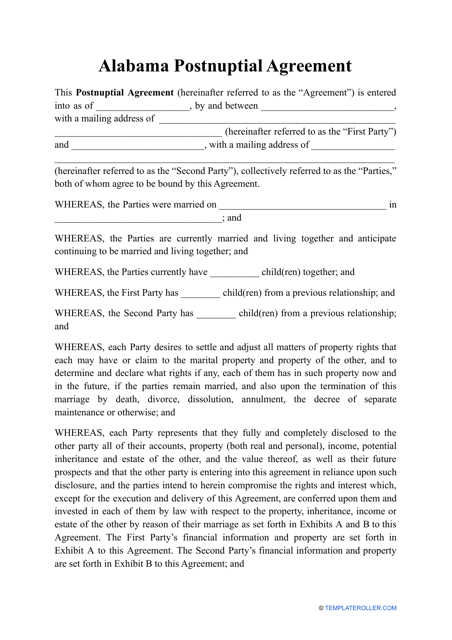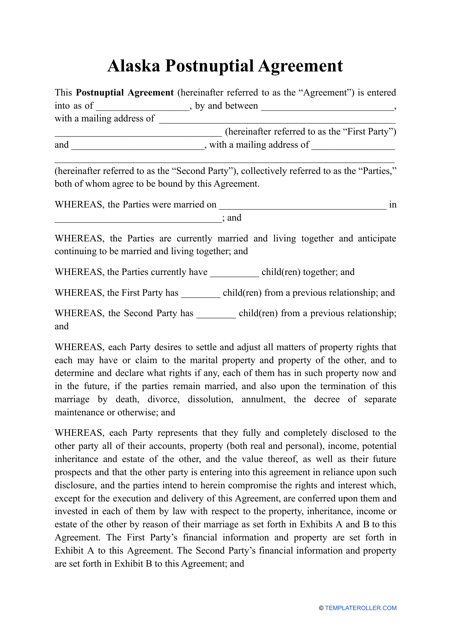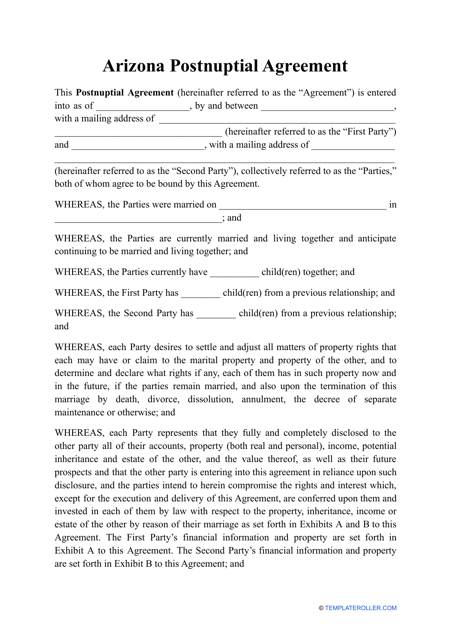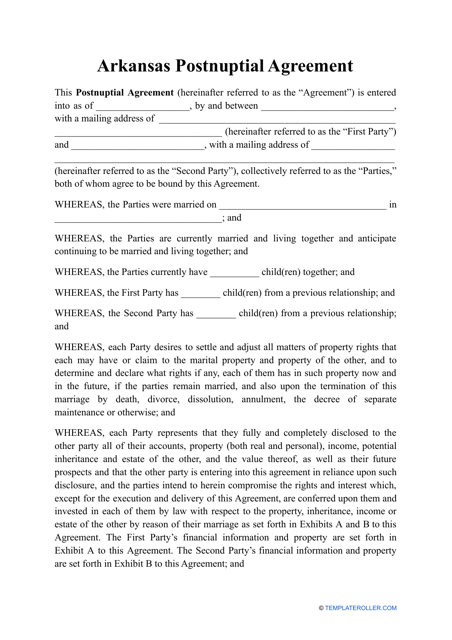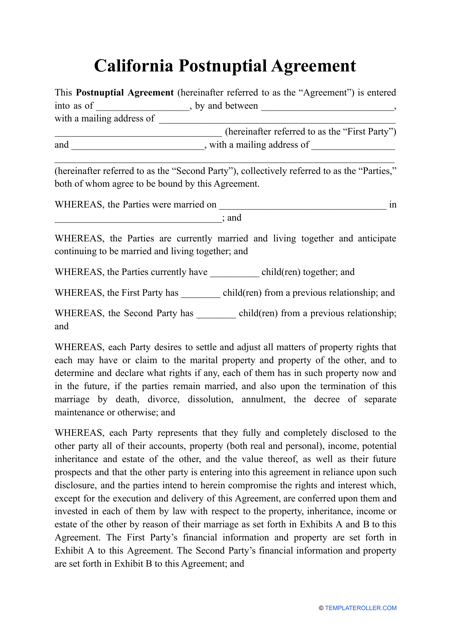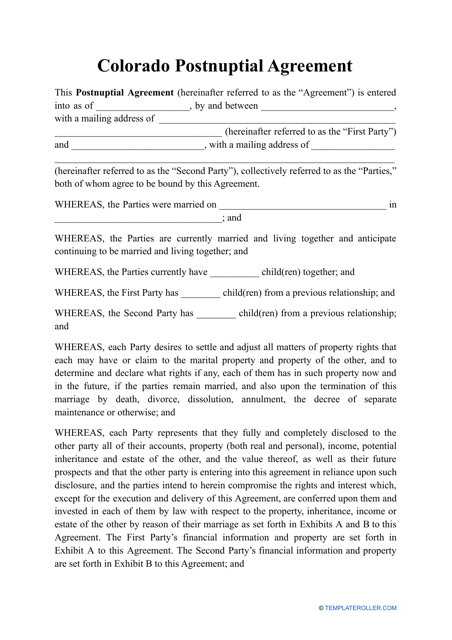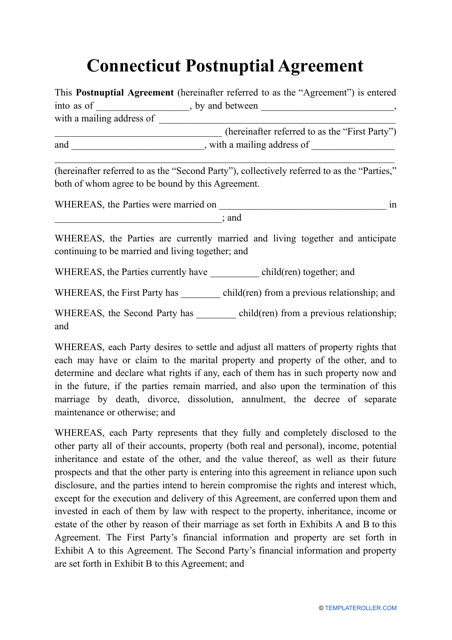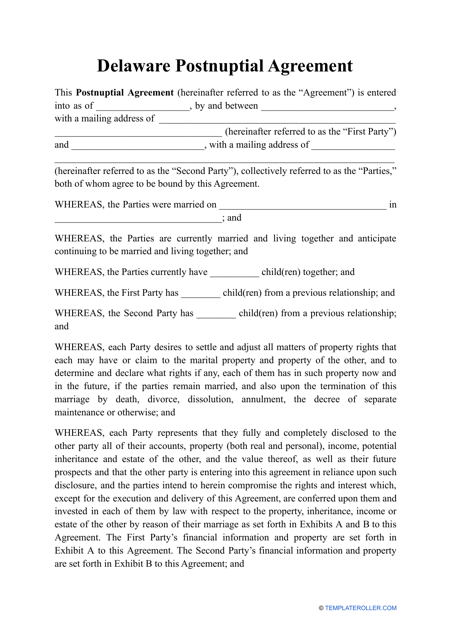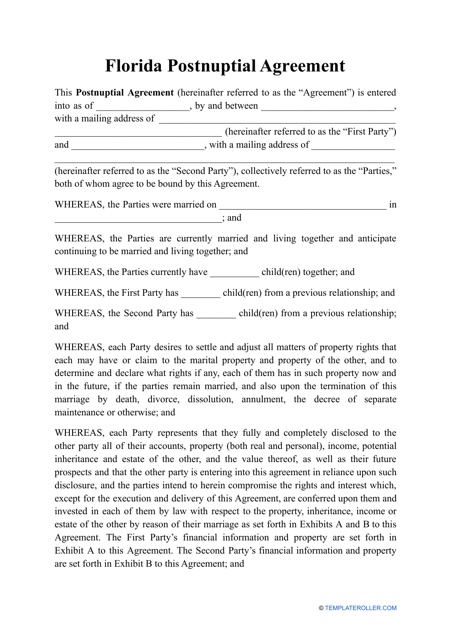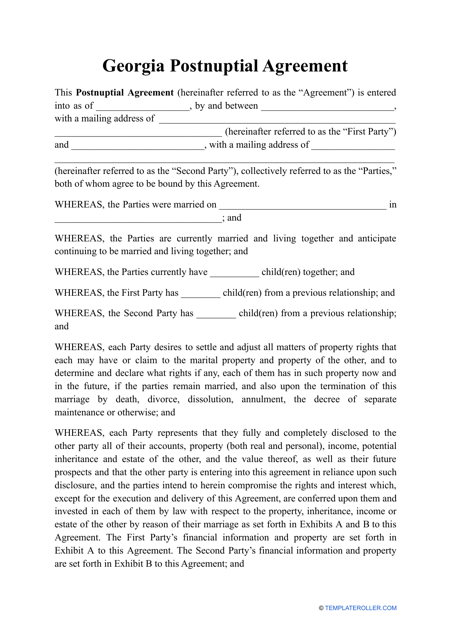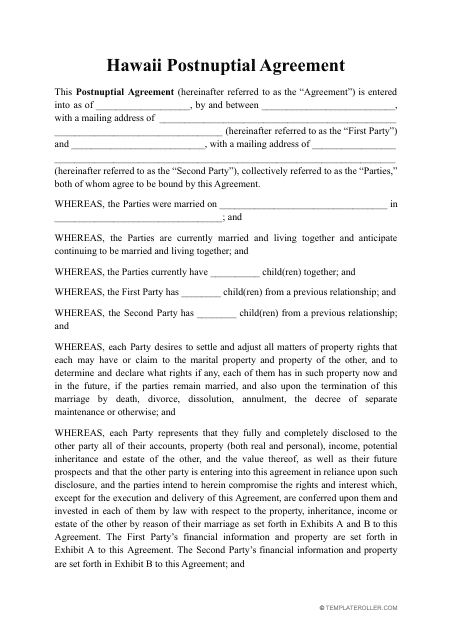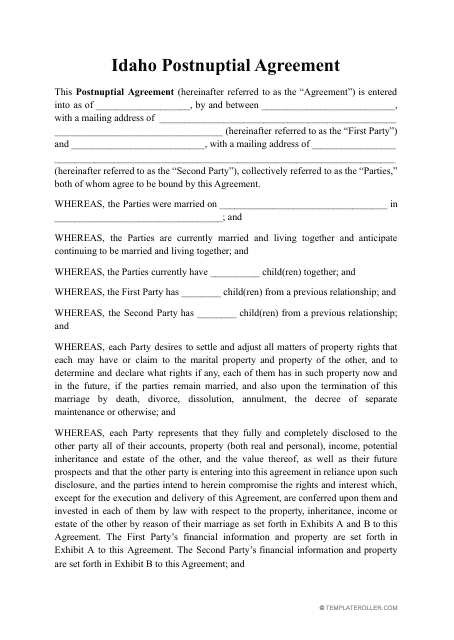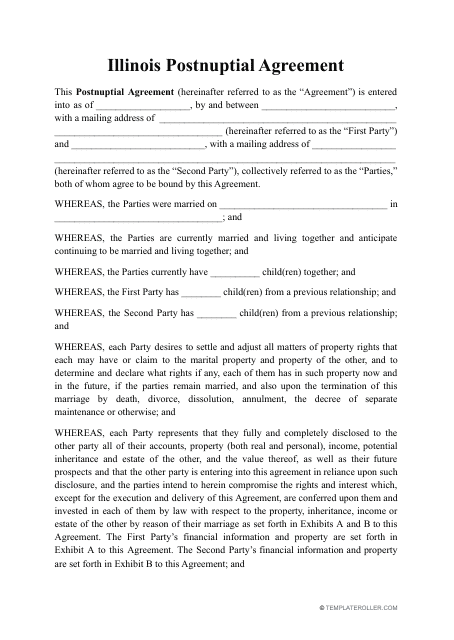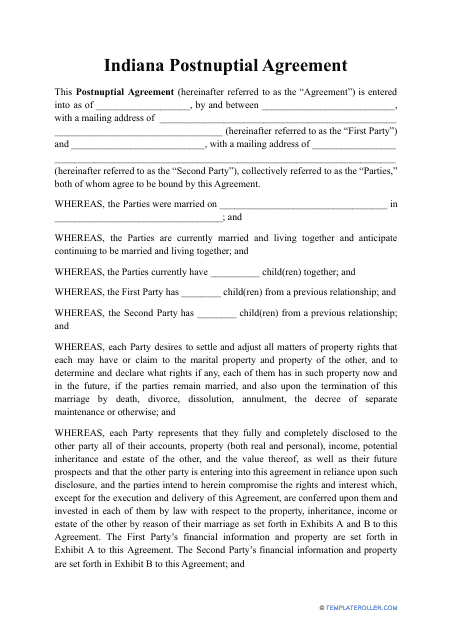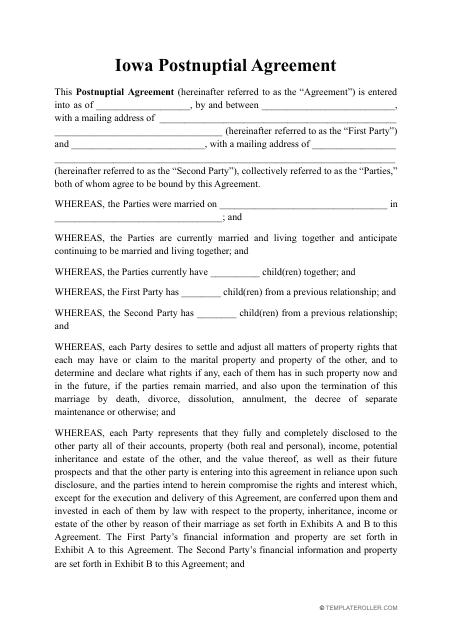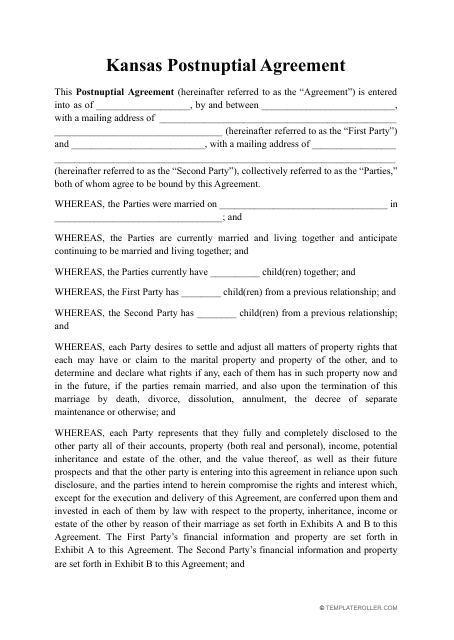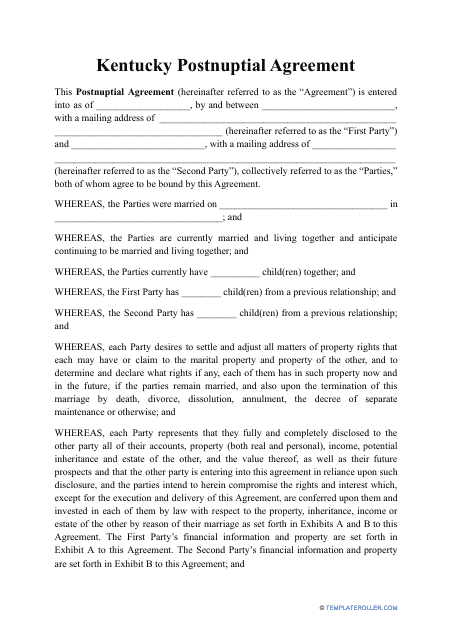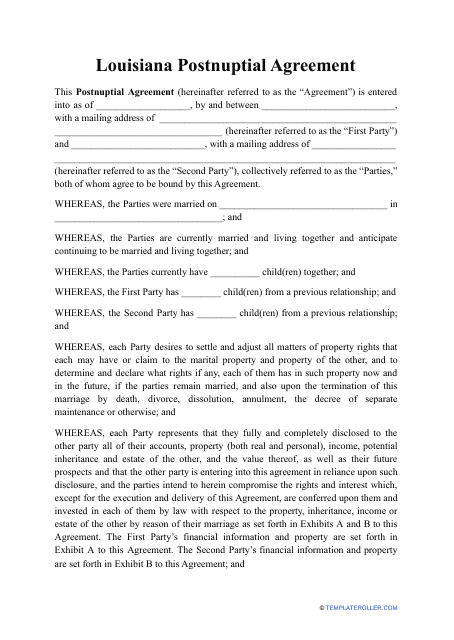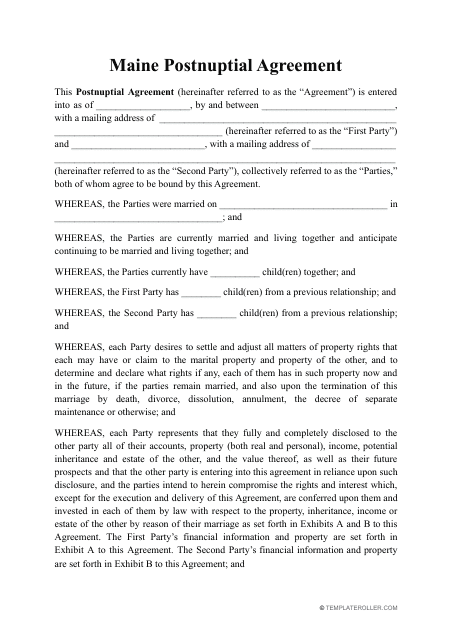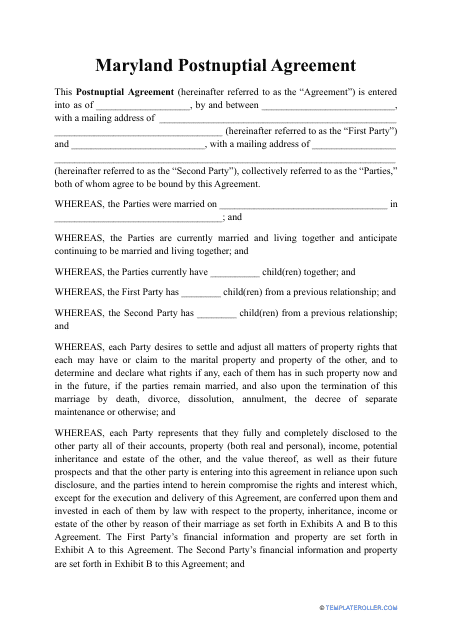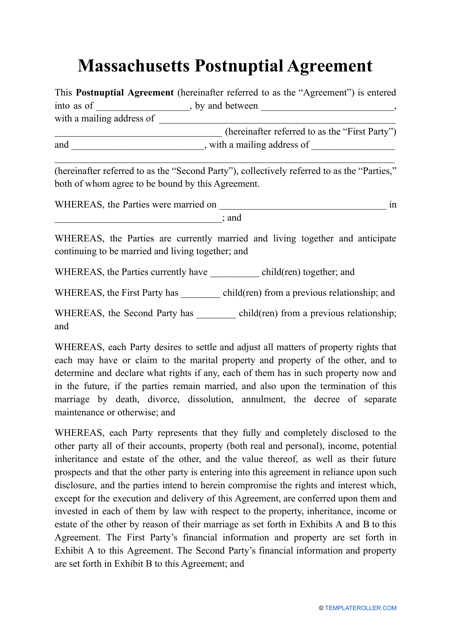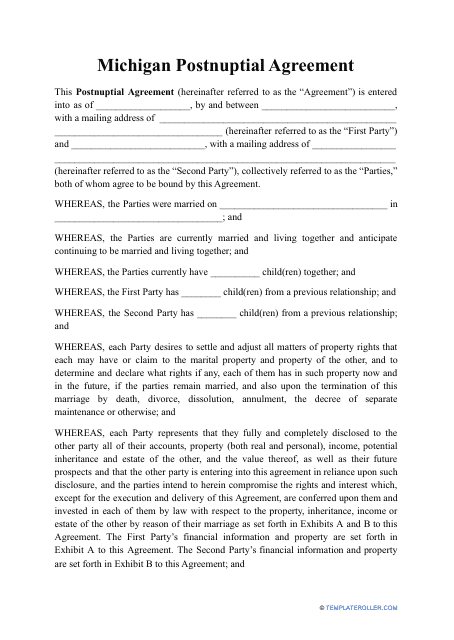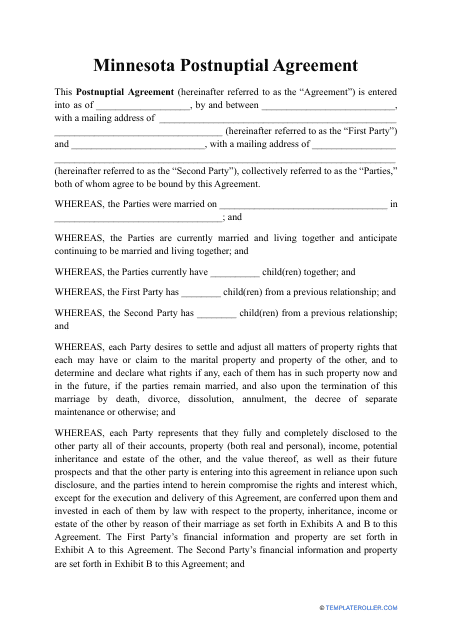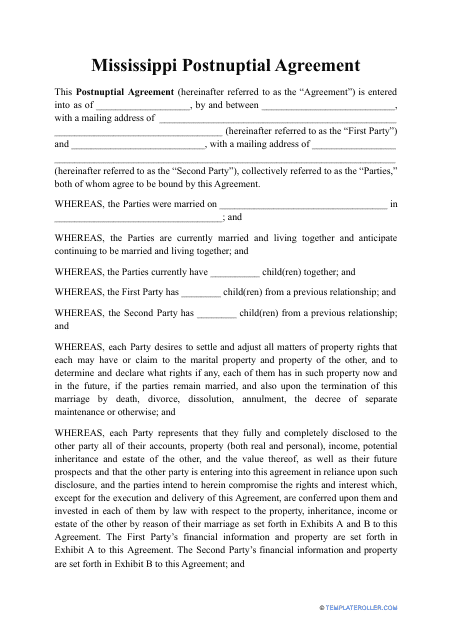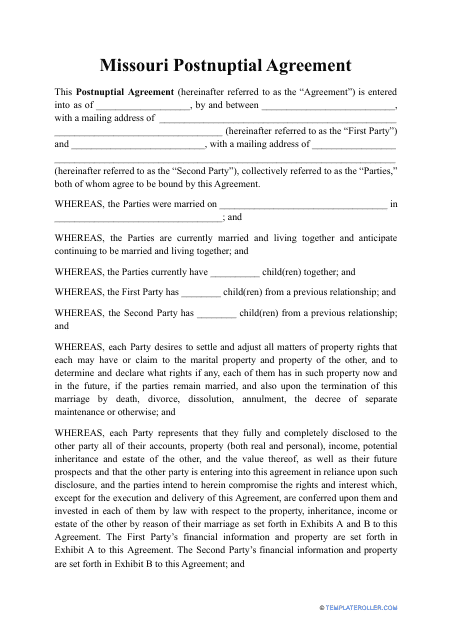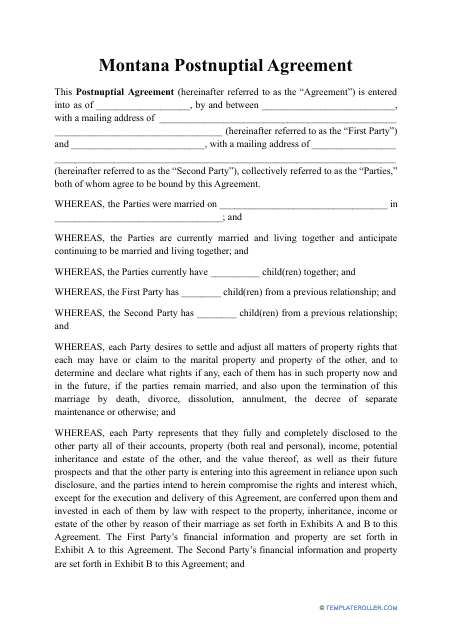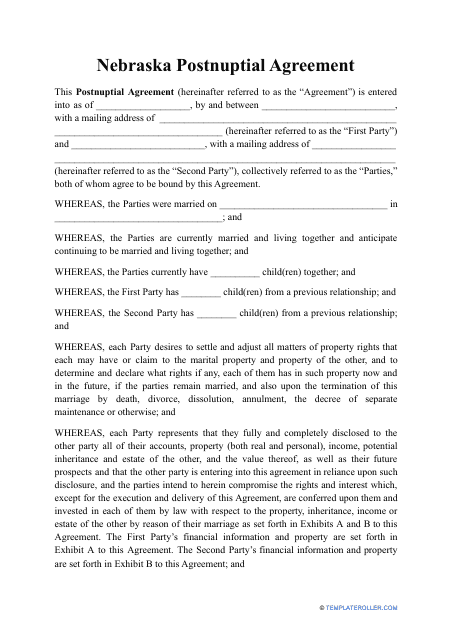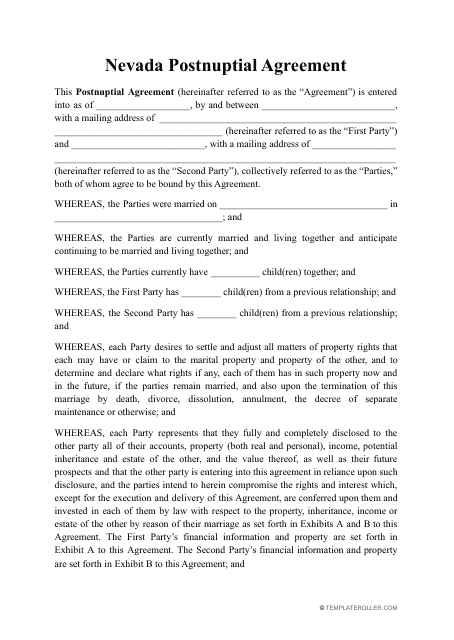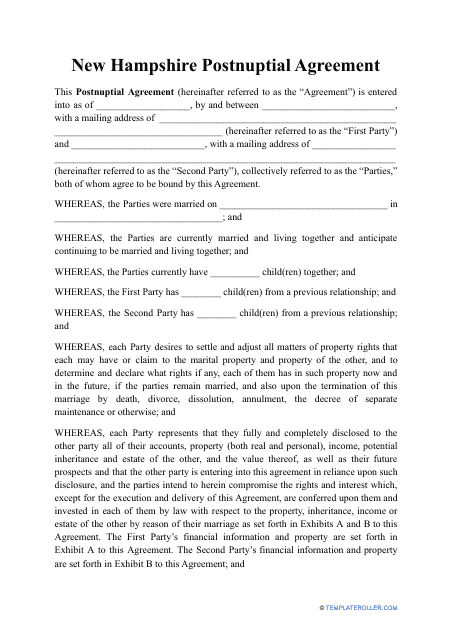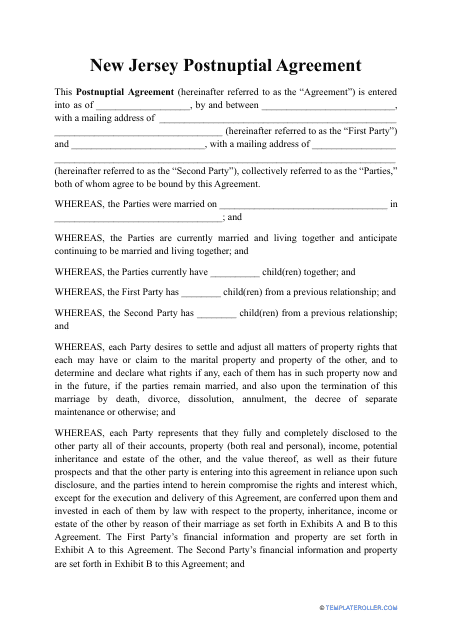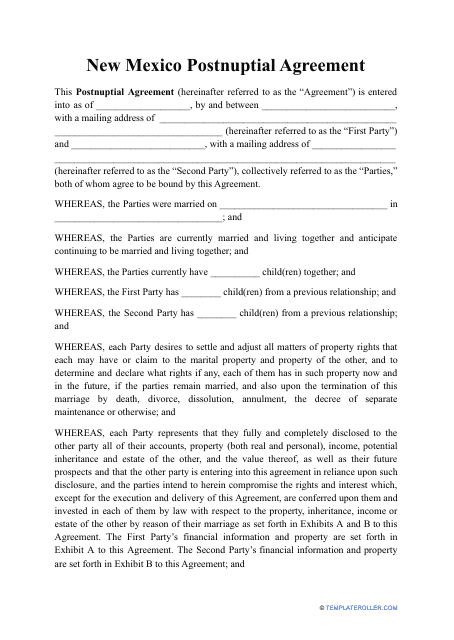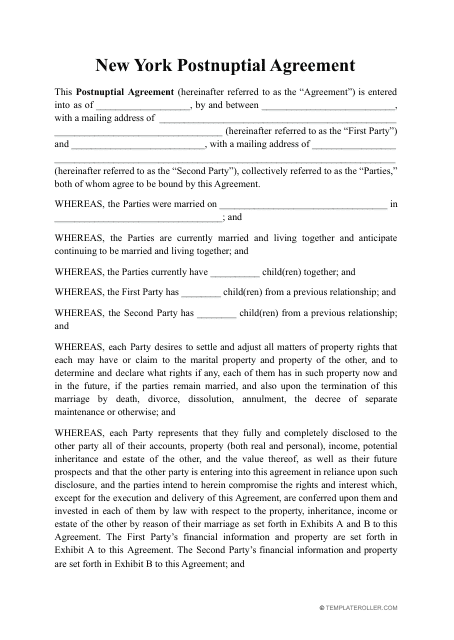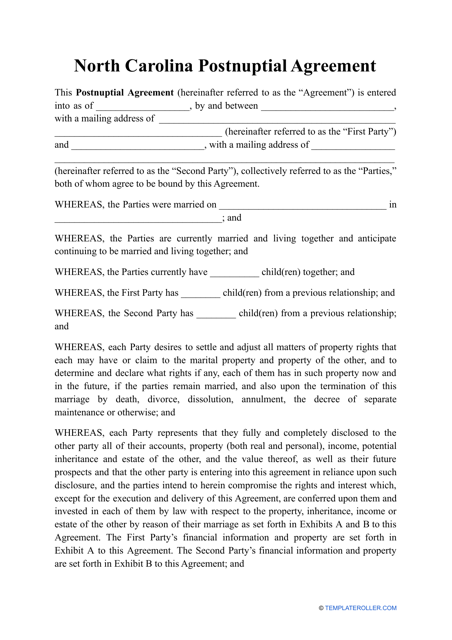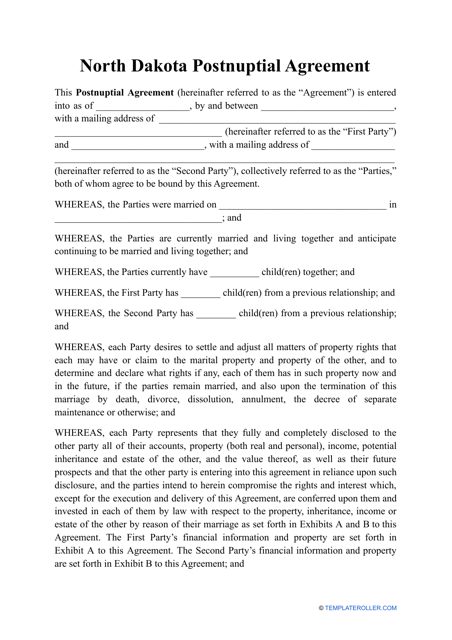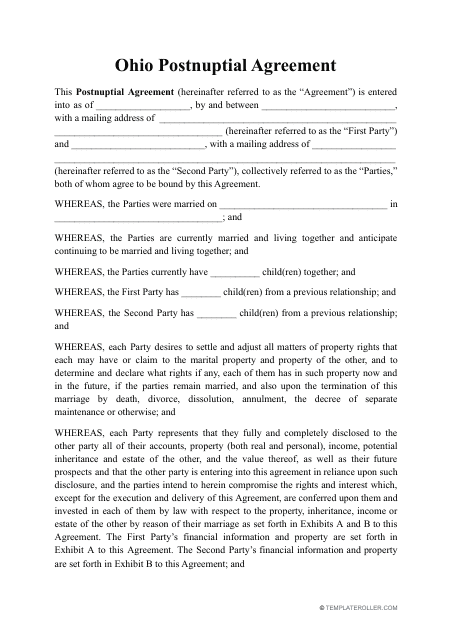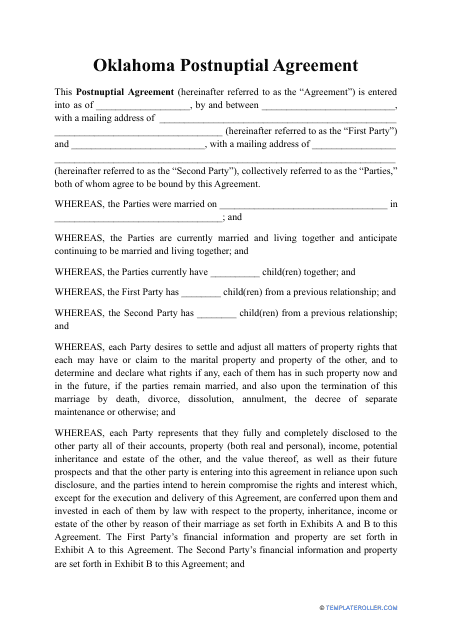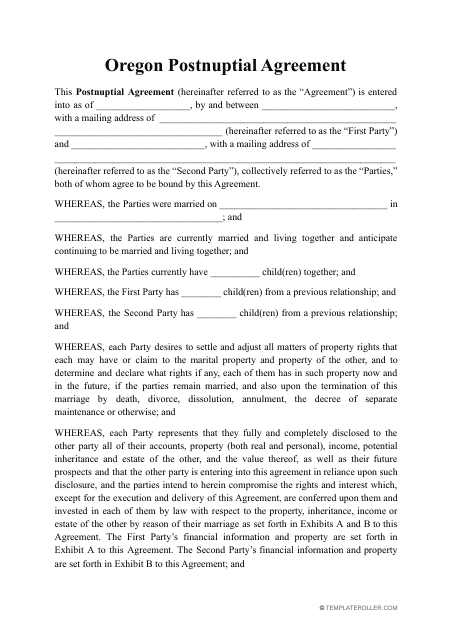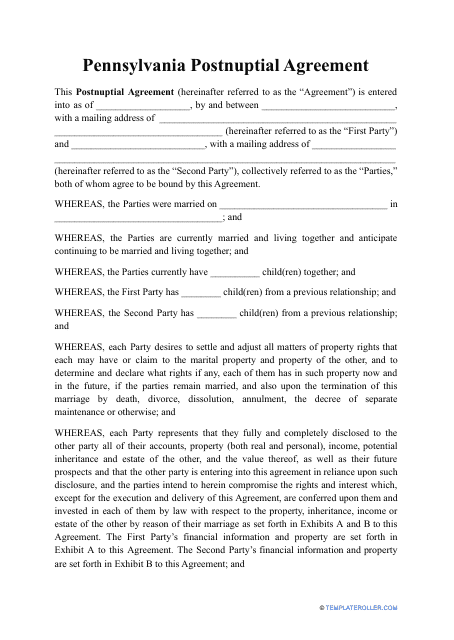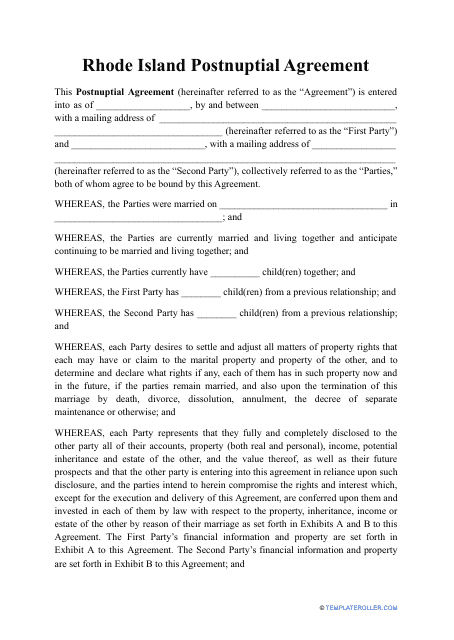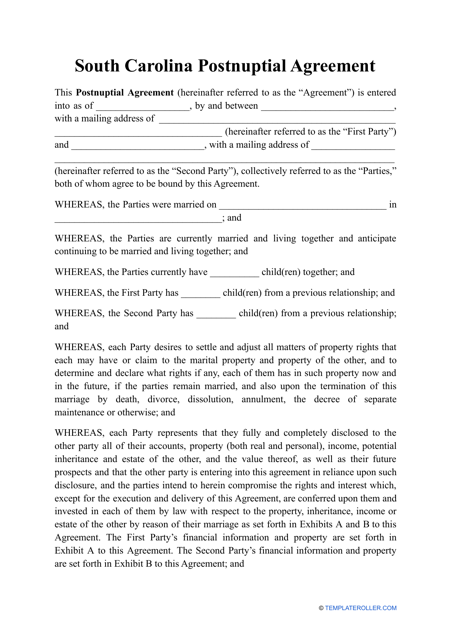Postnuptial Agreement Templates by State
What Is a Postnuptial Agreement?
A Postnuptial Agreement is a document formed after a couple has already married. The document itself may be heavily formulated to suit a couple's specific needs. They are the less popular but no less effective equivalent to a Prenuptial Agreement, which is signed by couples prior to getting married. Either spouse may profit from the protections offered by the Postnuptial Agreement.
Prior to actually getting married, nobody is in a rush to start discussing the potential division of assets because preparing for the big day can often be a very time consuming and stressful experience. A Postnuptial Agreement may be the best option for partners that regret not signing a Prenuptial Agreement or for those that have experienced a shift in their financial situation after tying the knot. They aim to protect both partners and their personal belongings which include estates, vehicles, and finances in the event that the couple decides to separate.
Prior to drafting any agreements, we would recommend each partner to separately seek legal advice from a Postnuptial Agreement lawyer which will be able to provide you with all of the important information concerning the agreements, whilst taking into account your specific circumstances. They will be able to guide you on what specifics to include in the agreement and the correct way to word each clause in order to prevent the clauses from being taken out of context and manipulated.
For a full list of Postnuptial Agreement templates please feel free to check out our library below.
Postnuptial Agreement Templates by State
You may find that there is a different Postnuptial Agreement law for each state. We have compiled a list of templates by state, which you can find below:
What Should Be Included in a Postnuptial Agreement?
Each Postnuptial Agreement is unique and will depend on the specific circumstances and agreements formed between the two partners. You may also find that Postnuptial Agreement laws in every state may differ and this may impact the clauses that you are allowed and are not allowed to incorporate into the Postnuptial Agreement. However, we have created a list of the top most common items that couples may include in their agreement which you can find below:
- The way in which partners would distribute personal possessions and estates in case their relationship results in a divorce;
- Details about any alimony payments to a partner and the period of time that these payments will be sent;
- The way in which any debts obtained during the marriage, such as home mortgages, outstanding balances on credit cards, and any other financial obligations, would be distributed in the case of separation;
- The way in which property would be divided in the event that either partner passes away during the union, with varying rules based upon whether or not a divorce process was in place at the moment that a partner died;
- When a couple that has children get divorced, a Postnuptial Agreement might also specify details concerning the care and maintenance of any mutual children that the pair may have. But, in this instance, such clauses in an agreement may be prohibited by local state legislation. It is always worth consulting with a lawyer when drafting this agreement.
No matter the purpose of your agreement or the contents, the key to a successful Postnuptial Agreement is to have a frank and honest discussion with your partner about the reasons and importance of forming such an agreement. The desire to form such an agreement does not indicate a lack of trust in the relationship, it can sometimes also be signed to determine specific rights in the event of a partner passing away to prevent long and tedious court proceedings.
How Much Does a Postnuptial Agreement Cost?
It is strongly advised that individual partners work with a lawyer to design their Postnuptial Agreement as it is an agreement that is enforceable by law, and just like any other agreement, it needs to contain certain stipulations in order to be upheld in a court. A skilled lawyer will be aware of the necessary provisions that need to be included to guarantee its legality.
According to research, the Postnuptial Agreement cost can vary from approximately $500 all the way up to thousands of dollars. This will depend upon a number of circumstances which include:
- The price of housing, living and other services in your specific state - the place that you are located in will frequently affect the cost;
- The intricacy and complexity of the agreement will also reflect on the overall cost;
- The number of meetings that the pair need with the attorney while the contract is being drafted;
- If any further amendments need to be made to the terms of the agreement;
- The price per hour that the lawyer will charge (which is also directly linked to the location).
How to Write a Postnuptial Agreement?
Writing up a Postnuptial Agreement is simple as long as you know the structure and what to include. Make sure to include:
- Details concerning both spouses. The marital history, any offspring from the union, legal counsel and financial statements all must be included in addition to the fundamental information about both spouses and their marriage;
- Share ownership. Any previously purchased property before the union may be designated as independent, shared, or a combination of the two. The same holds true for marital property acquired when the couple was already in marriage and information about how it would be shared;
- If either of the partners had their own business before they decided to tie the knot or a business that was opened when the pair was already in marriage, details about how the business will be shared also needs to be outlined;
- Just like any belongings, debt issues will also need to be resolved regardless of whether or not they were purchased prior to marriage or during the marriage;
- The property where you both live and any pets can also be distributed and included in the agreement;
- Details about the conditions of alimony and inheritance in the event of death could also be included additionally.
Once your agreement is drafted we would recommend that you approach a notary public to have the document notarized.
Haven't found the template you're looking for? Take a look at the related templates and forms below:
Documents:
50
This type of template is used in Alabama and helps to legally divide the assets of a couple that is already married.
This is a legal document used in Alaska by a couple that is already married which clearly lays out the conditions and terms that concern any assets, such as properties, if one of the partners dies, or if there is a divorce.
This template is used by an already married couple in Arizona to detail any information regarding what will become of any estates that are owned by the couple in the event that one of the spouses dies or decides to get a divorce.
This template is a legally binding contract used in Arkansas and signed by the spouses at any time during their marriage to establish their mutual rights and obligations.
This type of template is used in California and helps to legally divide the assets of a couple that is already married.
This template is used in Colorado and its main use is so that there will be no ambiguity when it comes to sharing possessions and properties if a situation such as a divorce or death of either spouse occurs.
This is a legally binding contract used in Connecticut that is formed between spouses during the time that they are married to help regulate their assets in the event of a death or divorce.
This is a legal document used in Delaware by a couple that is already married which clearly lays out the conditions and terms that concern any assets, such as properties, if one of the partners dies, or if there is a divorce.
This agreement is used in Florida and outlines how properties will be allocated, either completely or partially, if one of the spouses passes away or if the married couple decides to get a divorce.
This template is used by married couples in Georgia and clearly lays out the conditions and terms that concern any assets, such as properties, if one of the partners dies, or if there is a divorce.
Married residents from Hawaii may use this template to clearly set out any conditions, responsibilities, and terms that involve sharing any properties if one of the individuals dies or if the couple decides to get a divorce.
This type of template is used in Idaho and helps to legally divide the assets of a couple that is already married.
A married couple from Illinois may use this type of template to detail what will happen to any properties that are owned by the spouses in the event of a death or divorce.
This agreement is used by married couples in Indiana and serves as a formal, documented agreement concerning the way that a property will be divided in the possible event that a spouse files for divorce or passes away.
This is a legal document used in Iowa by a couple that is already married which clearly lays out the conditions and terms that concern any assets, such as properties, if one of the partners dies, or if there is a divorce.
Married couples in Kansas may use this type of template to clearly lay out the conditions and terms that concern any assets, such as properties, if one of the partners dies, or if there is a divorce.
This is a legal document used in Kentucky that is created by two spouses during the time that they are married and details the way that a property is to be divided in the event that one of the spouses files for divorce or dies.
This type of template is used in Louisiana and helps to legally divide the assets of a couple that is already married.
Married couples from Maine may use this template to clearly lay out the conditions and terms that concern any assets, such as properties, if one of the partners dies, or if there is a divorce.
Married residents from Maryland may use this template to clearly lay out the conditions and terms that concern any assets, such as properties, if one of the partners dies, or if there is a divorce.
This template is used in Massachusetts and serves as a legal guarantee and contract, which outlines what will happen to a property in the event that a spouse passes away or requests a divorce.
This type of template is used in Michigan and helps to legally divide the assets of a couple that is already married.
This template is used in Minnesota and is a legally binding instrument discussed and approved by two partners at any time during their marriage to establish mutual rights and responsibilities.
This is a formal document used in Mississippi that is negotiated and drafted by a married spouse to outline their rights and duties which will apply during their married life and once a divorce is formalized.
This is a legal document used in Missouri by a couple that is already married which clearly lays out the conditions and terms that concern any assets, such as properties, if one of the partners dies, or if there is a divorce.
This template is used in Montana between married couples and is classed as a formal contract with the main use of it relating to property delegation in certain life events.
Married residents from Nebraska may use this template to clearly lay out the conditions and terms that concern any assets, such as properties, if one of the partners dies, or if there is a divorce.
This is an agreement used in Nevada between two people that are married and wish to legally divide their assets in the case of a death of one of the spouses or a divorce.
This type of template is used in New Hampshire and helps to legally divide the assets of a couple that is already married.
Married couples from New Jersey may use this template to outline and determine the fate of any properties that are owned by the spouses in the event of a death or divorce.
This type of template is used by married couples in New Mexico and clearly lays out the conditions and terms that concern any assets, such as properties, if one of the partners dies, or if there is a divorce.
This is a document used in New York that serves as a formal contract detailing the way that a property is to be divided between two individuals that are married in the event that one of them files for divorce or passes away.
This type of template is used in North Carolina and helps to legally divide the assets of a couple that is already married.
If you are a resident of North Dakota and you want to form a legal agreement between you and your married partner, you will require this template which can only be signed by individuals that are married.
This template is a formal document prepared and signed in Ohio by a married couple to list the rules and regulations related to their life together and the potential separation.
This is a formal document used in Oklahoma to outline different financial and personal terms that married spouses establish for each other.
This is a legally enforceable contract used in Oregon that outlines the arrangements made by spouses regarding their marriage and possible divorce.
This type of template is used in Pennsylvania and helps to legally divide the assets of a couple that is already married.
This template is a legally binding instrument used in Rhode Island, by an already married couple, to outline the distribution of their assets during a divorce and plan the co-parenting of their kids.
This is a legal document used in South Carolina by a couple that is already married which clearly lays out the conditions and terms that concern any assets, such as properties, if one of the partners dies, or if there is a divorce.

